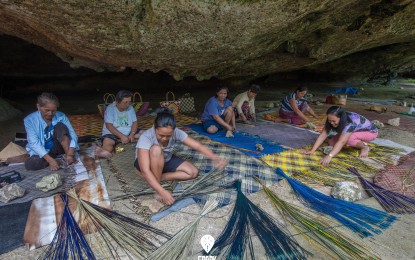
MAT WEAVING. Women of Basey, Samar weaving mats inside the Saob Cave in this July 27, 2020 photo. A lawmaker in Samar province is pushing for the passage of the law developing the mat weaving industry and recognizes the town in Samar as the country’s banig (woven mat) capital. (Photo courtesy of Spark Samar)
TACLOBAN CITY – A lawmaker in Samar province is pushing for the passage of the law developing the mat weaving industry and recognizes the town in Samar as the country’s "banig" (woven mat) capital.
In a statement on Monday, Samar 2nd district Rep. Sharee Ann Tan said the House Committee on Agriculture has already approved House Bill 6566 last week at the committee level.
The legislative measure titled “An Act Developing the Tikog Industry, Creating for the Purpose the Banig Subsidy Fund and the Tikog Research and Development Center, and Declaring the Municipality of Basey in the Province of Samar as the Banig Capital of the Philippines.”
The bill aims to protect, develop, and support the “tikog” industry through the creation of a Banig Subsidy Fund and Tikog Research and Development Center.
“Tikog” is a special reed grass that grows in swampy areas along rice fields and has solid, jointless, and usually triangular stems. Before super typhoon Yolanda (Haiyan) struck in 2013, the grass had grown naturally in the wild, but rising demand for woven mats depleted its supply. Banig or woven mat is the main by-product of “tikog”.
The bill also seeks to recognize the town of Basey, Samar as the banig capital of the country.
Tan said Basey is well-known for its colorful and woven tikog-based products and handicrafts most especially the multi-purpose mats, which may, in turn, be used as a material for the production and creation of other products.
“Banig weaving is a century-old practice in Basey town which has been passed down from generation to generation and has a great significance to the history and culture of Samar and its people, more so to the people of Basey wherein it has developed into a flourishing household industry and became a prime source of livelihood, most especially among women weavers,” Tan added.
However, in recent years, the growth of the banig industry has been hampered by the effect of super typhoon Yolanda that struck the region nearly seven years ago.
The town was one of the most devastated areas in the region where its “tikog” was among the most damaged by the super typhoon.
“Although rehabilitation efforts were undertaken by the local government unit as well as various organizations, the lack of capital investment, lagging technology, lack of engagement from the youth, contributed in stifling the industry from reaching its full potential,” Tan said.
“It is then apparent that more funding and support is required in order to fully rehabilitate, develop and augment the industry into a commercially competitive endeavor for the purpose of providing greater economic upliftment for the people, as well as to preserve its historic and cultural legacy,” Tan added in her explanatory note.
Under the proposed law, the Tikog Research and Development Center functions include undertaking and conducting research and technical studies on the development, production, management, and marketing of “tikog” and its by-products.
The center must also publish research studies, papers, articles, and other works or writings relating “tikog” and “banig” research and development with the end goal of benefiting farmers, weavers, traders, and other stakeholders.
The center must also formulate a “tikog” and “banig” development roadmap or program, as well as developing innovations in production and development.
Through the center, they are expected to provide technical support and assistance for the sustainable “tikog” production and development activities, as well as promote and provide adequate training to farmers and individuals and other stakeholders to engage grass propagation, production, processing, and distribution in Samar province.
The bill also aims to establish standard grading, sampling, and inspection, test, and analysis, specifications, packaging, preservation, conservation, and transportation of “tikog” and its by-products.
The center is also expected to assist and coordinate with the Department of Trade and Industry (DTI) for exporting in local and international conferences, trade fairs and expositions, and exhibits and to the Department of Education for developing and implementing a banig weaving program in the curriculum of select senior high schools in Samar province.
The bill also seeks to provide banig subsidy funds to financially support and provide capital development to banig production, weaving, trading, and skills training.
Formulation of implementing rules and regulations once the bill is approved into law will be done by the Department of Agriculture, Department of Environment and Natural Resources, Department of Science and Technology, DTI, and Samar State University.
Under the proposed law, at least PHP20 million will be appropriated under the General Appropriations Act to develop the industry. (PNA)
